- Home
- Scott Turow
The Last Trial Page 20
The Last Trial Read online
Page 20
The lawyer, Emilia Dash, has been pressed into service with less preparation than might be ideal, and Marta has a field day with her on cross-examination. Ms. Dash is unaware of a 2012 FDA white paper that concluded that adverse events are routinely underreported in the course of clinical trials. Then it turns out that one of the ‘regulations’ Ms. Dash claims PT—and Kiril—violated is actually an FDA guideline, which is, in legal terms, no better than a suggestion. Because the pharmaceutical industry tends to battle any effort by the FDA to promulgate new rules, the agency often is limited to publishing guidance. The drug makers who want their products approved tend to follow these advisories when it suits them, but in the courtroom the difference between what is done in practice and what is done because the law requires it is critical, and Ms. Dash ends up deeply embarrassed.
When Sonny adjourns in the afternoon, it has been a far better day for the defense than Stern anticipated this morning. He returns to the office in the company of Cecil Jonas, a senior partner at a DC firm representing PT in its new battles with the FDA over the agency’s effort to retract its approval of g-Livia. Cecil has come to town to observe the proceedings. The success of Marta’s cross-examinations of the FDA witnesses is due in no small measure to the hours Cecil has spent tutoring her.
But no matter how thorough Cecil’s expertise on pharmaceutical law, that does not make him a maven about everything that happens in the courtroom, which he is not inclined to recognize. Perhaps the steepest cost of the aid the Sterns have received from the many big firms involved in the countless civil matters brought against PT and Kiril is having to endure hours of advice from various senior partners about how Stern should proceed with the defense. Almost none of these lawyers has ever tried a criminal case. They are successful ‘litigators,’ meaning they are skilled in taking depositions and negotiating settlements, but with very limited experience with juries. That makes them a little like adolescent boys in a locker room in Stern’s day, pretending to know a lot about sex. After watching the proceedings, Jonas seems to think that Kiril is on the verge of acquittal, an idea Stern gently dispels.
“Cecil,” Stern tells him, “I cannot count the number of prosecutions where Marta and I felt we had decimated every witness for the government, and the jury returned with a guilty verdict even before we had time to leave the courthouse for lunch.” This, regrettably, is not false modesty. Unlike civil cases, where the venire come to court knowing nothing about either side, juries usually start criminal cases with faith in the prosecutors whom they tend to regard as public servants working for them. Stern shares with Cecil the watchword Marta and he have learned to live by: ‘The zombies keep coming.’ The phrase is borrowed from Henry, Marta’s younger son, who, when he was twelve, offered that quick summary of a video game he was playing. No matter how many zombies the good guys kill off, there are always more, and one inevitably will get you. Sooner or later a jury throws up its hands at the notion that person after person has shown up on the witness stand to lie, or that time and again the government has gotten things wrong.
Eventually, once Stern sees Cecil off, he gets to his voice mail, where he is surprised to find a message from Innis McVie. He had written to her after their meeting in Naples, telling her he hoped to arrange to speak to her again briefly about one point. In her message, Innis says she returned to Kindle County over the weekend and asks Stern to call, which he does. She seems delighted to hear his voice.
“Sandy!”
She explains she has come in to meet with the prosecutors before she testifies, probably later this week. Her niece also held off the christening of a new baby until Innis could attend yesterday.
“You said you wanted to talk again,” says Innis. “Is it business?”
“More or less.”
“Disappointing,” she answers, with a charming little trill. When Stern was single thirty years ago, after Clara’s death, he was shocked to find that the same women who would have found him invisible in high school or college, and would have taken his interest in them as downright insulting—those same women now sometimes seemed to find him attractive. He thought of Helen that way, truth told. And logically speaking, at this stage Stern should be at an even greater advantage now that the Grim Reaper is reducing the field of his competitors every day. Nonetheless, Stern still regards Innis’s flirting as dubious. He knows he has little to offer her. She could pass for fifteen years younger, while anyone looking hard at Stern would be inclined to call a coffin maker. Freud’s theories about females are often called into question these days with some reason, but in Stern’s mind the Viennese doctor had gotten to something eternal about the gulf between the genders when he asked with desperation, What do women want?
Innis and he agree to meet the following morning for breakfast at the University Club, where Stern often uses Marta’s membership. The club is close to the courthouse and to the PT condo Innis says she is still entitled to stay in for a couple more months under her severance agreement with the company.
As Stern is packing up to leave the office, he finds Pinky in his doorway. He can guess the subject from the way she looks around first to see if her aunt is within earshot.
“So, like, Detective Swanson finally called me back,” says Pinky.
“Yes?” he says impatiently.
“Swanson said about 165 white 2017 Malibus are registered in Greenwood County, according to the DMV.”
“And six of them are at PT?” Overall, Stern would have guessed there might be more of the cars in the area, but the numbers are neither here nor there. Granted, he was hit only a couple of miles from PT, yet there is still a good chance all this is no more than a coincidence. “What did Detective Swanson say about your research?”
“Totally bored. She said what you said: There weren’t any cars with front-end damage in the PT lot. But when I told her that maybe somebody went straight to the body shop with the Malibu, she said, Well then, get your client’s records for those cars.”
“Yes, Pinky, but our client does not want us to do that. Nor are we going to stage an end run by encouraging the police to ask instead.”
From the way her face falls, Stern can tell that is exactly what she had in mind.
“Pinky, I cannot imagine a starker conflict of interest than initiating a police investigation of our client, or the people he is allied with, when he has ordered us to leave the matter alone.”
It is all Pinky can do to keep herself from writhing with disappointment like a seven-year-old, but she heads back to the conference room, where she and the borrowed associates and paralegals are going over all of Kiril’s brokerage records in preparation for the next phase of the case.
Stern enters the hoity-toity preserve of the University Club Tuesday morning in a mood of dismay. What troubles him is realizing how comfortable he has grown moving through a world of wealth. He is rich by any measure, and his kids—given Solomon’s excellent investment advice about their inheritances from their mother—are even richer than their father. Stern’s age peers in the legal world have become, almost to a person, well-minted members of the upper class, and you would classify his neighbors in the West Bank the same way. His childhood in poverty still clings to him like the scent of smoke after a fire, and among the many reasons he has always insisted on continuing his free representation of poor clients is to see again firsthand how different this nation looks to its less blessed citizens. If he didn’t practice that kind of mindfulness, he could pass through his present life feeling utterly untouched by the harsh realities they often face.
Marta joined the University Club because it offers excellent athletic facilities, but Stern, especially in his present emotional state, finds it a palace of amusing pretense. The stained glass and flying buttresses and yellowed oak are meant to imitate the East Coast and its world of white wealth from which, in fact, most of the settlers of Kindle County had been deliberately excluded. Chief among them was the first European to arrive here, a trapper and trader named Jea
n-Baptiste Point DuSable, for whom the central municipality in the Tri-Cities is named, and who, even today, many locals do not realize was black.
Stern finds Innis waiting in the lobby, her back to him as she studies a wall of photos of former club presidents. She turns when he calls, and her beauty evokes an appropriately conflicted response in Stern. Professionally, he is committed to ignoring her attractiveness. Then again, it is hard not to be struck by her appearance, a well-preserved version of the perfect goyishe sweethearts like Doris Day who were the dainty goddesses of Stern’s youth. Dr. McVie is dressed for business in a tailored black suit and high heels, which make her a few inches taller than he. She is carefully made up, unlike the afternoon they met in Naples when she was fresh from the sea. Caught off guard at first, Stern realizes only now what Innis has been staring at: Donatella’s photo on the wall. When women were finally welcomed into the club’s upper ranks about twenty years ago, Donatella had served on the board of directors here, and then did a brief term as president.
“Always watching,” Innis jokes, with a sideward nod to the photograph.
They move to the elevator. In Dr. McVie’s company, he finds his balance better and tucks his cane beneath his arm. As soon as the waiter has served coffee, Stern, still in mind of the photo in the lobby, says, “Is it too personal to ask how Donatella and you dealt with one another?”
“It was smoother than you might think. She is a formidable person. Very very bright. She was civil to me. In public, I always had the sense that we were engaged in a contest to see who could appear more unruffled by the other. I’m sure she’d be quite polite to me now, even warm. After all, she’s won. I’m out. She remains. In whatever position that is.”
Stern offers a rumble of sound in agreement. “I have to admit, the Pafkos’ arrangement puzzles me. I have known Kiril and Donatella for decades, and Clara and I, Helen and I—we thought of the two as especially well settled. Now I find that was far from the complete picture. I could probably say as much about anyone’s marriage, but I am still having trouble fitting the pieces together. Not only did Kiril have another part of his life that I am sure was quite important to him”—Stern nods to Innis—“but I have come to assume Donatella recognized and accepted that.”
“It always seemed that way, although believe it or not, nobody ever said it out loud. I’m probably the last person who can explain why Donatella acquiesced.” Innis manages a laugh. “I would never tell you that they were not deeply attached to each other. But I never had any deep insights into their bond. Kiril always presented their relationship as very dour, even bitter. I understood things were being slanted for my consumption. But as I got the story, Donatella was the darkness and I was the light. Still, I took it for granted that he could never make do with just one of us.”
Stern asks if Innis was content with that, and she struggles with the question, twisting her shoulders a bit.
“Well, this is getting quite personal, isn’t it?”
“It goes without saying that you may simply tell me to mind my own business.” He wonders for a second, if Dr. McVie and he had met on another footing—say the one she’s seemed at moments to toy with—if this were, God save him, a date, how Innis might have explained her years with Kiril to him? He was a widower. She was what? A discarded mistress of three decades? His guess is that she would simply slam the door on it and describe herself as someone not to wallow in the past.
“Well, it’s personal, but it’s nothing I’m afraid to say. It’s just rather difficult to explain to somebody else. There is something of the poet in Kiril. He pretends so beautifully. He had his own little walled garden where I joined him. When we were together, Donatella did not exist. I was not sharing. I had him to myself. We both fully believed that in those moments.” She nods, struck by the accuracy of her own explanation, while Stern absorbs what she’s said: ‘Kiril pretends so beautifully.’ That accounts for a great deal, including what Basem Kateb told him last week, which Stern, naturally, remains determined to keep to himself.
“I don’t want to sound like a blushing teenager,” Innis adds. “I knew I was accepting less than most people want. But I came to recognize that suited me very well.” She stops then and smirks suddenly as she looks at Stern. “You’re very good at getting me talking, aren’t you, Sandy?”
“I am very interested.”
“Well, that’s the right thing to say. I’ll protect myself and won’t ask why.” She laughs again, then spends a moment in silence, the bright blue eyes downcast, clearly deciding if she is willing to continue. At last, she tosses up her hands, as if to say, What the hell. “You know, I came to terms, Sandy, with who I am. When I was about five years into this with Kiril, I met a man. A lawyer, by the way.”
“From Kindle County?”
“Around here. He might even be someone you know. I’ll be discreet, however, since the fellow’s long since married someone else. But he asked me first. To marry him? And so it was all before me—a so-called normal life. The window was closing, but I was fairly sure I could have carried a pregnancy. He seemed willing, although I wasn’t sure what kind of father he was to the kids he had already. But I had to ask myself, Is that what you want? And the answer, Sandy, ultimately was no. That picture of coming home to a place I shared every day with somebody else, where every decision was a negotiation of some kind—I could not imagine that. I would have felt confined. The truth, Sandy, is that I am not a nester. I don’t want it. Oh, I love romance. I admit that. The initial phases, that delicious madness, screwing until you’re raw? I relish all of that. When I first met Kiril, we would lay in bed and cut out paper hearts for one another. I’m seventy, and I still don’t think I’m done with that.” She looks across the table with a fleet, risqué smile.
At eighty-five, Stern, too, is unwilling to accept that he could no longer fully experience that moment. But even if he weren’t Kiril’s lawyer, Innis’s last remarks sharpen the realization that they are not a good match. What she just confessed about her limited interest in intimacy is unappealing to him. It is hard enough to get close to someone who is eager to share her life. With Innis, by her own word, you would soon run headlong into walls. That had been the failing of his first marriage. He would never do that again voluntarily, certainly not when his time left might be measured in days.
“I am very touched by your candor, Innis. Truly. But you are at the nub of what puzzled me after our initial conversation. In Florida and again now you have said that both you and Kiril pursued other interests from time to time.”
“That was so for years,” she says.
“Then I have to ask this: What was it about Olga that caused you to turn your back on Kiril and leave PT? It sounds, frankly, like she was merely more of the same.”
Innis issues a brief derisive sound, a harrumph, rearing back to view him with more distance.
“You know, Sandy, an hour from now when I think back about this conversation, I’m going to ask myself, Why didn’t I tell him to ask his client all these damn questions?”
Her protest is sincere, but Stern also senses that there is another piece of Innis that enjoys reliving her time with Kiril. He feels no need to retreat.
“You would be well within your rights in saying that to me. But as I suspect you know, Kiril has a unique ability to evade questions he does not care to answer, given my closeness with Donatella.”
She hoots. “I’ll say.”
“When I signed on, I had no idea that Kiril’s personal life was going to matter in understanding the circumstances at the time”—he nearly said ‘of the crime’ but that would be bad form—“everything happened.”
“Believe me, Sandy, you won’t be learning all of that from me.” He sits back slightly, somewhat puzzled by the remark. Was there yet another woman with whom Kiril was spending time as the g-Livia trial neared its end? On balance, he decides he is just as happy not to know. “The answer to the question you asked is simple. Why was Olga different? Because he tol
d all of us—Olga, me, Lep, even ultimately Donatella—that he was going to leave his wife for her. At the age of seventy-five, he wanted a divorce to marry Olga. That was the last straw, Sandy. I had been the other woman for thirty-two years. And I had accepted the inevitability of that, that I could not supplant the woman he had already married, the mother of his children. And I know, I just told you I had no interest in marrying anyone. But I’ll be damned if I was going to settle for not being asked. To stick around and play second fiddle to Olga? That was beyond insulting.”
“But he didn’t leave Donatella.”
“Of course not. He’s terrified of her.”
“Is she temperamental?”
“Not especially. But powerful. Surely you see that. I imagine at some level she convinced him she was the key to everything he had accomplished, that without her he would be some flimsy imitation of himself, like one of those life-size cutouts of athletes or politicians that people prop up in windows as a joke.”
“And do you know what transpired between Kiril and Donatella?”
“I know what Lep told me. We had a long conversation about six months after I left PT. Whether what Lep said is true, I can’t say. You have a better source of information than me.”
“Granted, but do you mind repeating what Lep said?”
Again, she pulls her mouth around to determine how much that idea displeases her.
“Here are the basics. Kiril put Olga off for many months, claiming there was too much tumult in his life dealing with the final approval of g-Livia. He promised he would tell Donatella as soon as the product was on the market.”
“That is when you left, correct?”

 Testimony
Testimony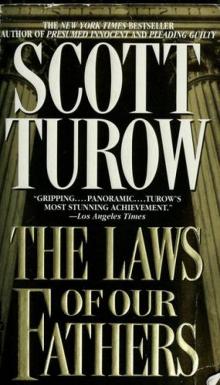 The Laws of Our Fathers
The Laws of Our Fathers Ordinary Heroes
Ordinary Heroes Personal Injuries
Personal Injuries Limitations
Limitations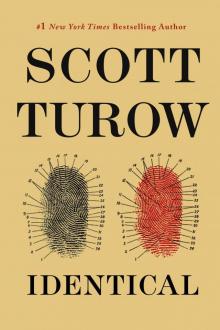 Identical
Identical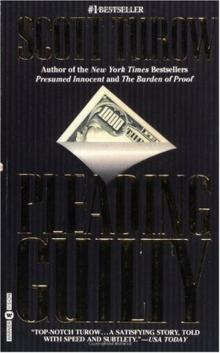 Pleading Guilty
Pleading Guilty Presumed Innocent
Presumed Innocent Reversible Errors
Reversible Errors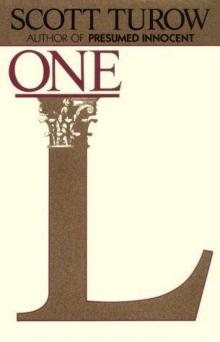 One L: The Turbulent True Story of a First Year at Harvard Law School
One L: The Turbulent True Story of a First Year at Harvard Law School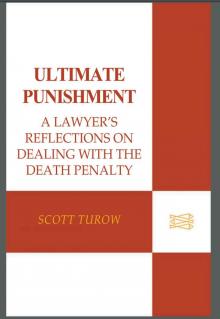 Ultimate Punishment
Ultimate Punishment The Burden of Proof
The Burden of Proof Ordinary Heroes (2005)
Ordinary Heroes (2005)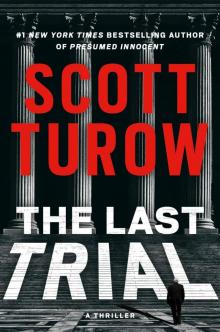 The Last Trial
The Last Trial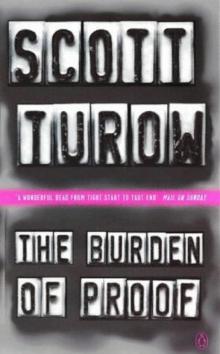 The Burden of Proof kc-2
The Burden of Proof kc-2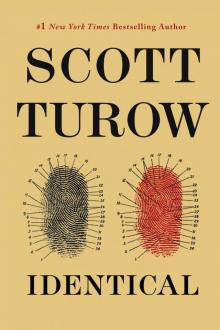 KC09 - Identical
KC09 - Identical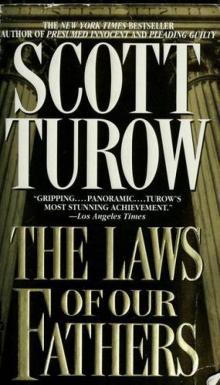 The Laws of our Fathers kc-4
The Laws of our Fathers kc-4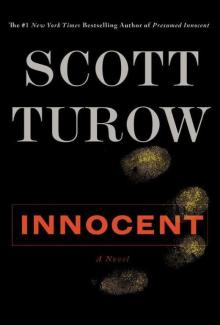 Innocent kc-8
Innocent kc-8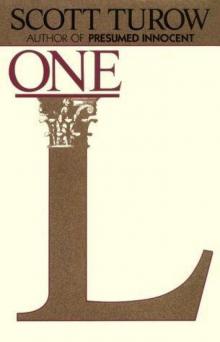 One L
One L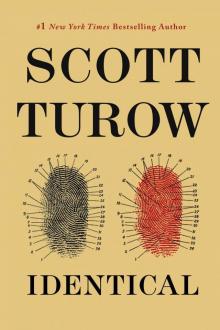 Identical kc-9
Identical kc-9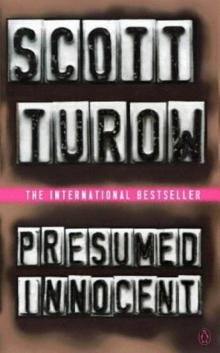 Presumed innocent kc-1
Presumed innocent kc-1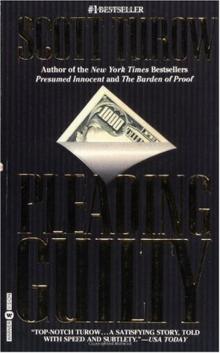 Pleading Guilty kc-3
Pleading Guilty kc-3 One L (1977)
One L (1977)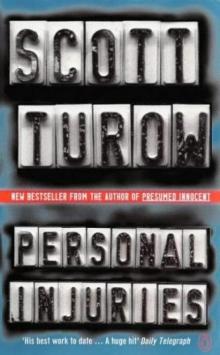 Personal injuries kc-5
Personal injuries kc-5